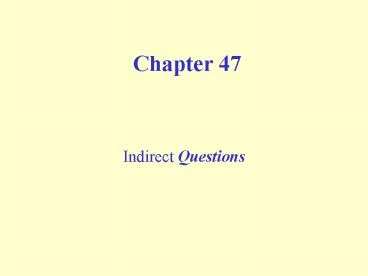Indirect Questions - PowerPoint PPT Presentation
1 / 10
Title:
Indirect Questions
Description:
'The verb goes into the subjunctive, according to The Sequence of Tenses, ... [had verbed] Imperfect. Subjunctive. Imperfect. Perfect. Pluperfect. Secondary. Sequence ... – PowerPoint PPT presentation
Number of Views:761
Avg rating:3.0/5.0
Title: Indirect Questions
1
Chapter 47
- Indirect Questions
2
For purpose clauses I have come to praise Caesar.
The verb goes into the subjunctive, according
to The Sequence of Tenses, dependent upon the
main verb
For indirect commands He persuaded me to stay.
The verb goes into the subjunctive, according
to The Sequence of Tenses, dependent upon the
main verb
For fearing clauses I fear that you do not
understand me.
The verb goes into the subjunctive, according
to The Sequence of Tenses, dependent upon the
main verb
3
For indirect questions I know where he is hiding.
The verb goes into the subjunctive, according
to The Sequence of Tenses, dependent upon the
main verb
4
The Sequence of Tenses (p. 268)
5
Indirect Statement
After verb of mental action, expect the
accusative/infinitive construction Scio vos me
non relicturos esse. I know that you will not
abandon me. Putaverunt castra sua oppugnari. They
thought that their camp was being attacked.
Indirect Question
After a verb of mental action followed by a
who, what, why, where, when, how? expect
Indirect Question
The verb goes into the subjunctive, according
to The Sequence of Tenses, dependent upon the
main verb
6
Scio Caesarem pervenisse. I know that Caesar has
arrived.
Scio cur Caesar pervenerit. I know why Caesar has
arrived.
Cognovit copias cogi. He knew that the forces
were being gathered.
Cognovit quo modo copiae cogerentur. He knew how
the forces were being gathered.
Rogavit quis populum incitavisset. He asked who
had stirred up the people.
Scimus te ibi habitare. We know that you live
there.
Scimus ubi tu habites. We know where you live.
7
Question Words
Quis? Qui? Cur? Quid? Quare? Quantus? Qu
amobrem? Quot? Quomodo? Qualis? Utruman/an
non Ubi Utrumneccon? Unde? Quemadmodum?
Quo? Quam? Quando? Uter?
8
Num
Num is used to introduce a direct question which
expects a no reply. Num tu me audis? You are
not listening-to me, are you?
num is also used after a verb of mental action
to introduce an indirect question, meaning if
or whether.
Cupio scire num Caesar pervenerit. I want to know
if/whether Caesar has arrived. Centurio rogavit
num Caesar pervenisset. The centurion asked
if/whether Caesar had arrived.
9
utruman
utruman is used to introduce an indirect
question meaning whetheror
Cupio scire utrum Caesar pervenerit an iter
faciat. I want to know whether Caesar has arrived
or is (still) travelling. Centurio rogavit utrum
Caesar pervenisset an iter faceret. The centurion
asked whether Caesar had arrived or was still
travelling. Debet intellegere utrum Caesar an
Brutus sit imperator. He ought to understand
whether Caesar or Brutus is commander.
10
utrumnecne
utrumnecne is used to introduce an indirect
question meaning whetheror not
Cupio scire utrum Caesar pervenerit necne. I want
to know whether Caesar has arrived or
not. Centurio rogavit utrum Caesar pervenisset
necne. The centurion asked whether Caesar had
arrived or not.































